The Politics of Meat: An Ecofascist Perspective
Originally from https://counter-currents.com/2020/07/the-politics-of-meat-an-ecofascist-perspective/
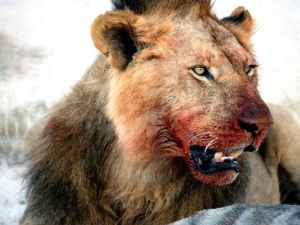 4,367 words
4,367 words
Jef Costello’s recent articles concerning the “Carnivore Diet” inspired me to ponder a subject that I had neglected for some time: the ethics and politics of diet.
As a student of ecological thought, particularly from a Rightist or traditionalist perspective, I am well-acquainted with the arguments concerning veganism, hunting, factory farming, and so forth. But after a flurry of youthful idealism, I mostly set these considerations aside and settled into a fairly comfortable compromise with the status quo. However, Mr. Costello’s articles have led me to reconsider these subjects from the perspective of the True Right.
My use of “ecofascist” in the title is somewhat ironic. As I have described before, “ecofascism” is a pejorative term, invariably applied to any Rightist approach to ecology which rejects the egalitarian premises of the contemporary green movement. A genuine “ecology viewed from the Right,” which promotes an understanding of the natural world based upon order, hierarchy, and differentiation, is far more nuanced — and possesses a longer pedigree — than its critics are typically willing to admit. However, having discussed this at length elsewhere, I will not go into much detail here.
Mr. Costello’s articles show that the conflicts between vegans and adherents of the paleo or carnivore diets are strongly related to their politics. Indeed, there are few issues that bring out the glaring contrast between Left and Right ecology more than the question of “animal rights” and meat consumption. In the following essay, I will examine these different perspectives and consider what outlook is most appropriate from the perspective of the ecologically-informed Right.
The Vegan Left
People become vegans for many reasons. Some simply dislike meat, while others believe veganism will improve their health. Some people want to dissociate themselves from the ecologically destructive and unsustainable practices of factory farming and meat consumptions. Others find the needless slaughter of living beings to be morally repugnant. The former two points will not be addressed in this essay, as I cannot really argue against personal taste, and the supposed health benefits (or lack thereof) of veganism have been suitably addressed by Mr. Costello. I will rather consider the question of sentience and the ecological impact of meat consumption, as these have the greatest bearing on ecological politics.
For many vegans, particularly those of the Left, the primary motivation for veganism is a desire to minimize suffering. Animals are sentient beings, capable of pleasure, pain, and fear, and their needless slaughter is therefore unconscionable. This particularly applies to the most egregiously cruel practices of factory farming, vivisection, the fur trade, and animal experimentation; vegans oppose hunting and other uses of animals in sport or entertainment as well.
There is a small distinction to be made concerning the intellectual foundations of this outlook. Some animal liberation theorists such as Peter Singer base their arguments on a utilitarian appreciation of the sentience of certain animals — their ability to feel pleasure and pain. Other thinkers like Tom Regan, more influenced by the Kantian liberal tradition, actually impute certain rights to the higher mammals. Notably, both approaches are informed by Enlightenment philosophies focused upon individual rights or happiness, rather than a holistic assessment of social or ecosystemic health. Despite these minor differences, they are therefore functionally identical in practice.
In short, for the Left, animal liberation is simply a natural extension of the egalitarian ideal, the “next frontier” in the expanding circle of rights. Animal liberation activists therefore view themselves as a contemporary iteration of the Underground Railroad, the French Resistance, or the civil rights movement.

Animal Liberation Front activists, ca. 1970
Few people, I think, would deny that most animals eaten by mankind are capable of feeling pleasure and pain, as well as a range of other emotions. Indeed, it is likely that they are capable of experiencing far more than humans are currently able to appreciate. Nevertheless, there are notable flaws in the animal liberationist/rights approach, which have important ramifications for how we ought to evaluate veganism.
For one, the focus on sentience creates a hierarchy of beings in which the “higher mammals” — those most capable of feeling pleasure and pain — take precedence over others. However, this fails to take into account the overall functioning of the ecosystem. A more holistic environmental outlook, such as Aldo Leopold’s “Land Ethic,” would prioritize the integrity and wellbeing of the biotic community as a whole. From this perspective, species of animals that are critical in the economy of nature — such as honey bees — would receive greater moral attention than psychologically more complex ones like rabbits, which are plentiful, globally distributed, and reproductively efficient.[1] Thus, in the event of a conflict between species (for instance, if wild rabbits were overbreeding to the point of destroying an endangered species of plant), priority would be given to the more ecologically critical and/or rarer species, rather than the most sentient. For the liberal or utilitarian thinker, the situation would be reversed. The rights of the most sentient being would take precedence, and abstract entities like “species” or “ecosystems” would have no consideration beyond their utility to individuals. Needless to say, these Leftist approaches also provide no moral consideration to entities like mountains, creeks, or landscapes.
The approach of animal liberation and animal rights theorists also fails to draw a distinction between wild and domesticated animals. While animal rights activists tend to focus more exclusively on livestock and pets, the holistic (and accordingly more Rightist) land ethic focuses mostly on wildlife. The reason for this is that, while obviously possessing a level of sentience appropriate to a complex mammal, the domesticated cow or pig is a human artifact whose influence on wild communities is almost wholly negative. According to J. Baird Callicott, such creatures “constitute yet another mode of extension of the works of man into the ecosystem.” Therefore, from the perspective of land ethic, “a herd of cattle, sheep, or pigs is as much or more of a ruinous blight on the landscape as a fleet of four-wheel-drive off-road vehicles.”[2]
Ultimately, ethical veganism of the Leftist variety is based upon an ethical postulate that pain is evil. This feature of Leftism, and modernity in general, was noted by Nietzsche a century and a half ago: “You want, if possible — and there is no more insane ‘if possible’ — to abolish suffering.”[3] However, from the perspective of the Right, pain and suffering are necessary and, to some extent, desirable features of existence. Pain not only serves an important function in a healthy nervous system, but in humankind may also spur a man into a higher level of development. In short, the desire of the Leftist vegan to abjure meat consumption because of the suffering it entails betrays a world-denying, life-loathing philosophy. As Callicott writes, “To live is to be anxious about life, to feel pain and pleasure in fitting measure, and sooner or later to die. This is the way the system works. If nature as a whole is good, then pain and death are also good.”[4]
Taken to its logical extreme, this desire to shield animals from suffering and death would entail an abolition of carnivorous animals, whose behavior — from the perspective of animal rights — would mark them as merciless, wanton, and cruel serial murderers. Predators such as wolves and cougars would therefore have to be exterminated, incarcerated, or otherwise rendered innocuous in order to defend the rights of other animals. Though this sounds ridiculous, some theorists have actually discussed purging the Earth of carnivores in order to create a morally more perfect world.
Thus, while ostensibly devoted to a rejection of anthropocentrism, in which humans are seen as the pinnacle of creation, the animal liberationists end up imposing his all-too-human morality on nature. The only way to eliminate animal suffering would be to take away their wildness altogether. The end result would be the domestication of the biosphere — remade according to the Left’s design.
In short, the major flaw in ethical veganism is the assumption that a life can be lived free of guilt, i.e., free of the necessity of sacrifice. From this perspective, harming and consuming animals is immoral because they are sentient and therefore capable of feeling pain. Vegans apparently believe that this does not apply to plant matter. However, as Joseph Campbell pointed out — as quoted in Mr. Costello’s article — this may just be ignorance on our part: perhaps we are simply “too insensitive to hear the plant scream.”
All life depends upon sacrifice and killing. The exception, ironically, is the life of plants themselves, who obtain their energy directly from the sun and are thus spared the burden of killing to survive. From the vegan perspective, therefore, the plant is the most spiritually perfect organism on Earth. Since plants serve directly or indirectly as the sustenance for all beings higher in the food chain, it could be argued that life itself is founded upon the ceaseless, unrepentant slaughter of Earth’s purest beings.
But it doesn’t stop there. Animal life is sustained by plants, and plant life is sustained by the sun. The sun provides energy to our solar system only by the ceaseless sacrifice of its vital spirit in the form of hydrogen; once depleted, the sun will expand to engulf the solar system before collapsing into a dwarf star and then dying altogether. Life on Earth is therefore dependent upon the ongoing and total sacrifice of the sun itself (making the sun’s traditional regal and religious significance that much more poignant).
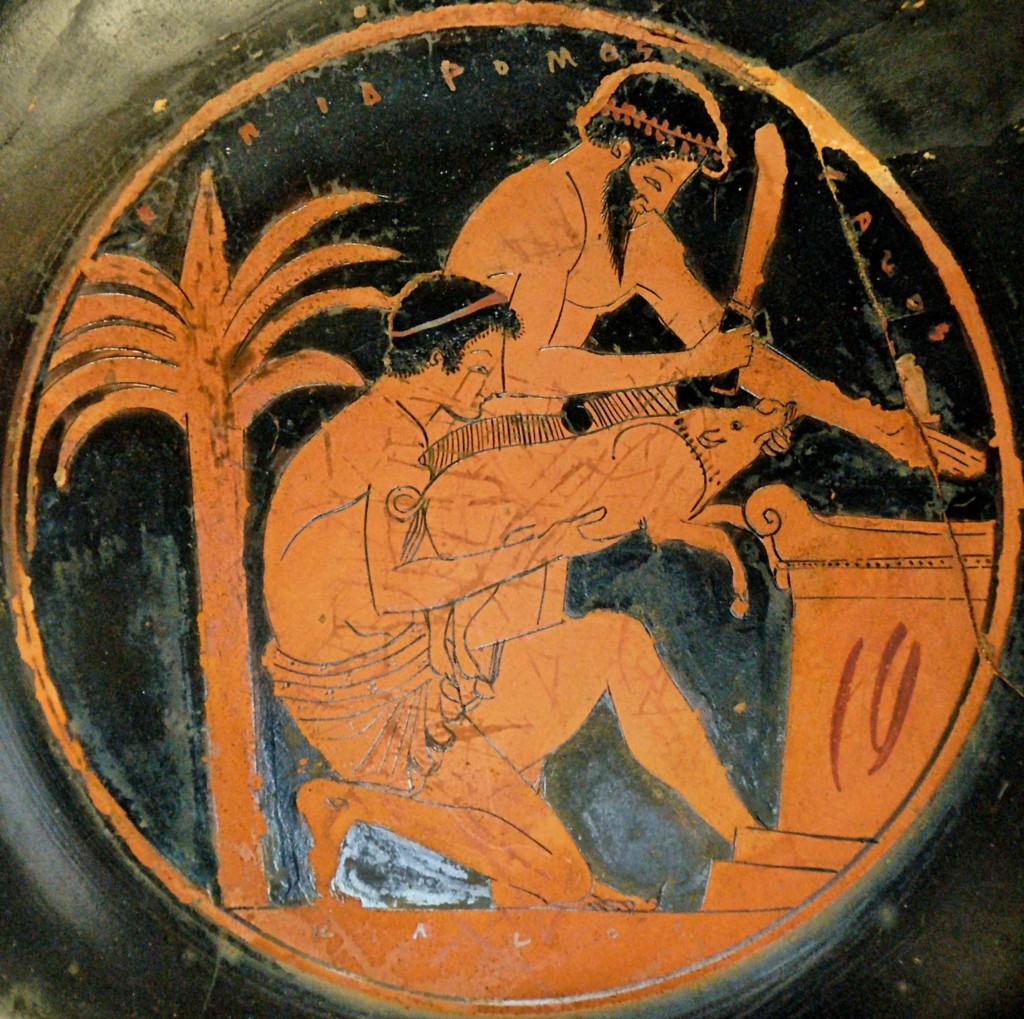
Sacrifice of a pig in ancient Greece c. 510–500 BC, from the Louvre collection.
Life is sacrifice. This perspective on existence obviously rejects the wholly benign vision of “mother nature” promoted by some of the less thoughtful environmentalists. However, this is not merely another version of the atheistic, amoral “nature red in tooth and claw” depicted by Social Darwinists. It is, rather, the traditional understanding of existence itself as a sacrificial act. As Alain Danielou describes the outlook of the ancient Indo-Europeans:
The universe appeared to the Vedic Aryan as a constant ritual of sacrifice. The strange destiny which compels every living thing to kill, to devour other things so as to exist, struck him with awe and wonder… We cannot live without taking part in the cosmic ritual either as instruments or as victims. Yet that part is positive only when we do it consciously and with the proper knowledge of forms and utterances. Through the voluntary ritual of sacrifice man takes his place in the cosmic symphony as an equal. The main purpose of his existence is the performance of this ritual.[5]
The fact that the notion of sacrifice is so recurrent in human culture shows that it is a perennial mystery of earthly existence. It is necessary for some things to die in order that others might live. This unpalatable feature of human existence is rejected by the Left, and this colors their typical approach to diet as well as other areas of human concern.
The Vegan Right
As Mr. Costello points out, veganism is nowadays strongly associated with the Left, and its opponents (and meat-eaters in general) are often castigated as “reactionaries” or “neo-Nazis.” It is ironic, of course, that the Carnivore Diet should be associated with Nazism, since Hitler and his compatriots were the strongest proponents of vegetarianism, animal welfare, and environmental preservation to have ever ruled a country. Himmler wanted to ban hunting, Goring sent Germans to concentration camps for violating animal welfare laws, and Hitler himself was a vegetarian who intended to shut down slaughterhouses in Germany after the War. Regardless, it is true that the National Socialist, “ecofascist,” and more generally Rightist approach to the natural world differ significantly in motivation from that of the Left.
Among the Right, veganism seems largely confined to National Socialists and some of their latter-day admirers. Savitri Devi was probably the most notable proponent of this line of thought. Some contemporary organizations also wed veganism and animal liberation with pro-white and authoritarian politics. One of these is Greenline Front, an organization developed in Eastern Europe with branches in other countries, while there are also some activists of this persuasion in the animal liberation underground. One activist who might be familiar to long-time Counter-Currents readers is Tia Azar Foster. Judging by the condemnation she recently earned from the good antifascists of Asheville, she has evidently not compromised her ideals since her interview with Keith Preston eight years ago.
The contemporary Left naturally looks with horror upon Right-wing or racialist permutations of environmentalism, and accuses Rightists of “appropriating” or “co-opting” their noble cause (never mind that conservation was originally an aristocratic preoccupation anyways). However, based on its history, Right-wing veganism cannot simply be reduced to an attempt to jump on a successful bandwagon. Moreover, unlike their Leftist counterparts, these vegans of the Right can appreciate that the laws of nature require blood and sacrifice, and do not deny the necessity of death and suffering. Why, then, do they embrace veganism?
Personal fastidiousness likely plays a role. More importantly, I believe that their deep appreciation for natural laws leads these Right-wing vegans to reject the arrogant humanism that justifies man’s domination over nature. They do not deny the existence of hierarchy, of course — they value the preservation of “nature’s aristocrats,” whether they be the noblest races of mankind, or the highest specimens of the plant and animal world. However, they categorically reject the humanistic notion that mankind is, merely by virtue of its rationality or “soul,” intrinsically superior to the rest of the natural world. They associate this anthropocentrism with the Abrahamic religions, and hold it responsible for many of the ecological and ethical evils perpetrated by adherents of these religions. They believe that Judaism, Christianity, and the modern Western philosophies that followed them regard animals and nature as a collection of resources for human use, in contrast to the more life-affirming attitudes of indigenous European traditions.
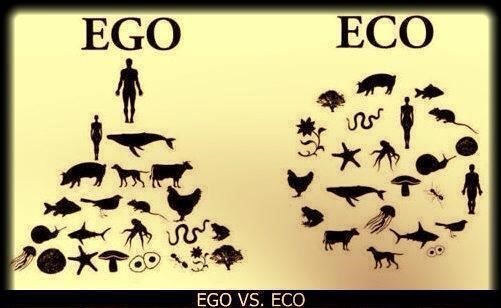
Ego versus Eco.
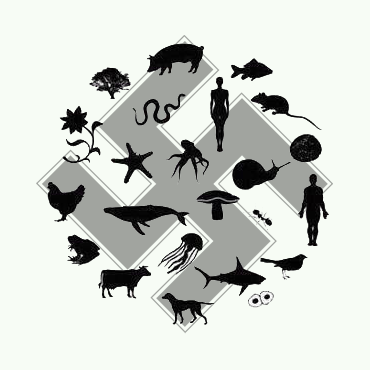
Ecofascist.
In this rejection of anthropocentrism, they agree with vegans of the Left. However, while the Left imposes its own morality on nature, the Right evaluates human behavior in the light of natural law. From this perspective, mankind little merits the veneration of its humanists. It is inferior and ignoble humans, reveling in their own sense of superiority, that pose the greatest threat to the truly noble peoples and species of the Earth. For this reason, Savitri Devi calls upon the faithful aristocratic remnant:
To preserve, insofar as it is still possible, the beauty of the world: human, animal, vegetable, inanimate; all beauty; to obstinately and efficiently preserve élite minorities; dedicatedly to defend them at all costs — all noble minorities, whether they be those of the Aryans of Europe, Asia, or America, conscious of the excellence of their common race; or of those splendid large felines threatened by extinction; or of those noble trees threatened by the atrocity of being uprooted by bulldozers in order to install, on their nourishing soil, invading multitudes of mammals with two legs, less beautiful and less innocent than they.
In Devi and similar writers, one senses a profound indignation — not at the reality of death and suffering, but rather that noble and beautiful animals should die at the hands of such manifestly inferior specimens of mankind. The very idea that the soft, decadent, cosmopolitan urbanite of the present could boast about his superiority to the “beasts” from the comfort and safety of his apartment, that innocent animals should suffer in order to feed a bloated population of Untermenschen, or test cosmetic products, or to provide entertainment — all of this is cause for anger. It is not the mere fact of men killing animals that irks them, but rather how and in what quantities these animals were killed — and who was responsible for the killing. Savitri Devi speaks critically of sport hunting in the Roman Empire, for instance, but acknowledges that the human impact on the natural world was not particularly egregious until technological development permitted much vaster encroachments into wilderness and prolonged the human lifespan.
Thus, the Rightist vegan rejects meat consumption out of love for other animals, an acknowledgement of our interrelatedness with them, and a fierce contempt for the arrogant anthropocentrism that would drive wild animals to extinction, condemn legions of domestic animals to slaughter, fell the forests, poison the waters, and blacken the sky. Their veganism is, therefore, part of their rejection of modernity and longing for a cleaner, purer world. Some might argue that in rejecting meat consumption for humans, these Rightist vegans are in fact behaving in a profoundly unnatural manner, and arrogantly setting themselves above the rest of life. To this, Savitri Devi has an intriguing response:
He who has the Word, father of thought, and who, far from putting it in service of the essential, wastes it in the search for personal satisfactions; he who has technology, fruit of thought, and who makes use of it especially to increase his well-being and that of other men, taking that for the main task, is unworthy of his privileges. He is not worthy of the beings of beauty and silence, the animal, the tree — he who himself follows their path. He who uses the powers that the Word and thought give him to inflict death and especially suffering on the beautiful beings that do not speak, in view of his own well-being or that of other men, he who uses the privileges of man against living nature sins against the universal Mother — against Life — and the Order that desires “noblesse oblige.” He is not Strong; he is not an aristocrat in the deep sense of the word, but petty, an egoist and a coward, an object of disgust in the eyes of the natural élite.
In short, given man’s high capabilities, it would be unconscionable to devote them purely to the aims common to men and animals — propagation, consumption, and self-preservation. To merit his status as an aristocrat of nature, man must transcend his animal nature and devote himself to the preservation of the pure and noble.
In evaluating this outlook, it is clear that Rightist veganism avoids many errors of its leftist counterpart. It does not deny the value of suffering and death, or posit that man’s task is to abolish them; it does not rest upon any chimerical egalitarian notions, but rather recognizes an order and rank among creatures (without placing mankind as a whole invariably at the top); and it avoids the confusion of granting particular animals “rights” that might stand in opposition to overall ecological health.
Additionally, all forms of veganism condemn the human exploitation of animals in factory farming, vivisection, the fur industry, circuses, and trophy hunting. Leftist vegans condemn these for the needless pain and suffering they cause. By contrast, the Rightist ecologist recognizes that what is immoral in man’s treatment of these animals is not the pain inflicted — all animals experience pain in the wild, as a consequence of predation, disease, starvation, and cold. The true evil is the transformation of self-willed creatures into machines, human artifacts whose life consists of being confined to a cage and injected with drugs. Compared to this, a life in the wild is preferable, even if it is punctuated by episodes of hunger and pain and ends in a burst of terror and agony.[6]
In short, vegans are absolutely correct about the immorality of how humans treat animals. But does this mean that all forms of meat consumption are inherently immoral? Since I think we can all agree that humans indisputably evolved to eat meat, there does not appear to be any sound biological argument against continuing to do so. And if we evolved to eat meat, there does not appear to be any particularly good argument against hunting for it (unless doing so would lead to the species’ extinction). In fact, if one is chiefly concerned with suffering, then getting taken down by a bullet is probably far less painful than starvation, prolonged sickness and exposure, or being ripped apart by a grizzly bear.
As for the supposed benefits of the vegan diet as opposed to the garden-variety omnivory, Mr. Costello’s articles make a compelling case that the health benefits of veganism are overstated. However, this does not mean that it has no benefits at all. The avoidance of animal products was traditionally believed to be more conducive to a higher spiritual state. The sattvic diet described in Hinduism, which is also described as the “yogi’s diet,” counsels the avoidance of flesh and most dairy, as well as certain fruits and vegetables which tend to stimulate and inflame the organism. This is also one reason that traditional Lenten austerities included a generally vegan diet: in addition to being an act of asceticism, such a diet was believed to grant access to higher spiritual states.
Speaking from my own experience, in my attempts to recreate the rigors of medieval Lent I found that a vegan diet did exercise a calming effect on the libido and passions, and gave me a general feeling of emptiness that allowed for greater prayer and meditation. That being said, it may not be desirable to feel that way all the time, and I found the vegan diet very difficult to sustain. And there are times when the raw energy and virility that can come from meat consumption are necessary for action (hence the pallid, unmotivated “soy boy” stereotype). So, unless one is striving to achieve certain heightened spiritual or intellectual states, prolonged veganism is unlikely to be conducive to long-term strength or wellbeing.
Eating Meat, the Right Way
So, should the carnivore diet — or at least a diet that includes meat — be considered an important part of the Rightist lifestyle?
For those who would emphasize the “manliness” and essentially Right-wing quality of eating meat, it is necessary to point out that eating dead animals, alone, does not make a man or an authoritarian. The soy boy may eschew a rare steak and his testosterone levels might suffer thereby; but is the garden-variety American, overweight, pumped full of chemicals, munching on a fast-food hamburger while binge-watching Netflix, really any better? The mere consumption of meat does not require any true masculinity, discipline, honor, or sacrifice. One buys it at the store, wrapped in plastic, no different from a bag of potato chips or a block of tofu. Moreover, the sources of most of the meat we consume are responsible for poisoning the land and water, injecting artificial hormones into our bodies, deforesting previously wild land in order to turn it into a factory of living flesh, and in short, bringing the world one step closer to a storehouse for human consumption.
There are a few solutions to this problem. One is to eschew the factory farms and buy meat and dairy products directly from small farmers. This serves the dual function of supporting local businesses. Better yet, if you are lucky enough to have the opportunity, try to raise some livestock yourself. You’ll actually know what they’re being fed, you’ll experience a sense of satisfaction at successfully raising them, you’ll ensure that they have a decent life, and you will also be personally responsible for their slaughter. For if we are to eat meat, we should know where it comes from, and we should be aware and appreciative of the sacrifices that are made to sustain us.
However, for men who wish to get in touch with their truly primal roots, short of close-combat warfare, there is nothing quite so primeval as the hunt. Myriad benefits accrue to one who returns to this ancestral lifeway. One learns silence and stillness, ruthlessness and respect. It cultivates mental and physical toughness, concentration, awareness, and skill. More than hiking or camping or fishing, hunting is the outdoor activity that truly places one back into nature.
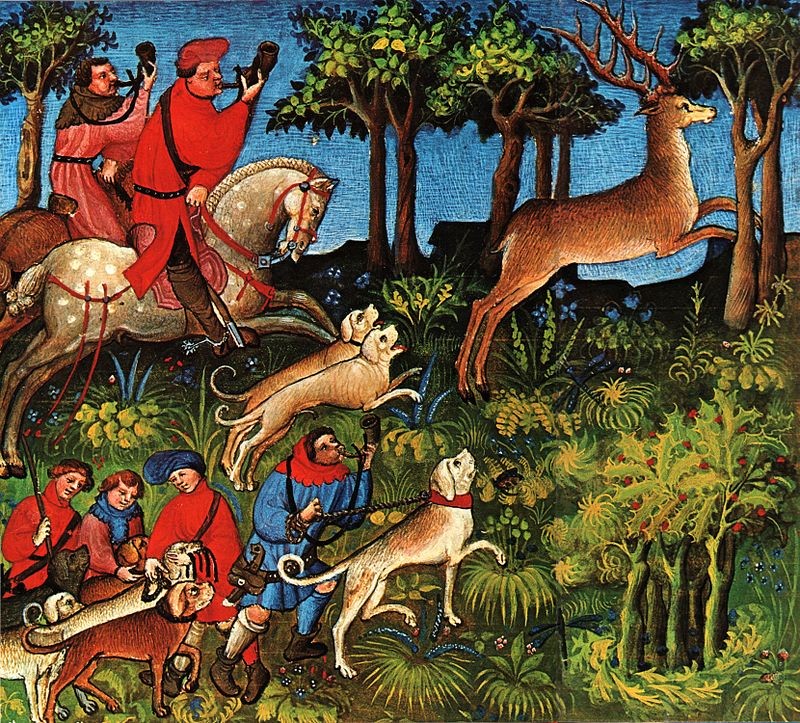
Livre de la Chasse, French, c. 1430-40
Hunting is a traditionally noble pastime — indeed, most of the wild parks in Europe, the United States, and Africa began as the hunting preserves for royalty and aristocrats. Hunting is the most visceral way to learn about discipline, observation, awareness, and the act of killing that is currently available to mankind. Whatever game you catch will taste better than anything you have ever eaten, as you will have earned it by the sweat of your own brow and it will not be injected with chemicals and corrupted by domestication. You will learn a true respect for the animal other, for as Ortega y Gassett writes, “The greatest and most moral homage we can pay to certain animals on certain occasions is to kill them with certain means and rituals.”[7] And finally, your licensure will contribute more to the conservation effort than any urban vegan who recycles and protests climate change ever will. If you truly wish to set yourself apart from the modern, take up hunting, or at least make an attempt. It doesn’t have to be an expensive hobby. Bows can be gotten for fairly cheap, as can a hunting license.
The problem with both of these alternatives, of course, is that family farming and hunting are not sustainable occupations to feed our rapidly increasing populations. It is the exploding human population that rendered such abominations as factory farming and industrial agriculture necessary in the first place. So, unless there is a significant curtailment of human population growth or considerable technological advances, this will not be a viable solution for all.
However, we have to start somewhere. Since those on the Right constitute a breed apart, and often fancy ourselves an aristocracy of sorts, it is only appropriate that we adopt particular dietary practices associated with traditional civilization and the old world nobility. In terms of formulating an authentic counter-culture, how we eat plays an important role. The growing interest in ancestral diets, small farming, locally sourced food, and hunting is an important step in the right direction.
Notes
[1] Baird Callicott, “Animal Liberation: A Triangular Affair,” in In Defense of the Land Ethic: Essays in Environmental Philosophy. Albany: State University of New York Press, 1989. 25.
[2] Ibid., 30.
[3] Nietzsche, Beyond Good and Evil, aphorism 225.
[4] Callicott, 33.
[5] Alain Danielou, The Myths and Gods of India. Rochester, Vermont: Inner Traditions International, Ltd., 1985. 63, 67.
[6] Callicott, 35.
[7] Jose Ortega y Gassett, Meditations on Hunting. Belgrade, Montana: Wilderness Adventures Press, 2007. 101.
Note on comments privacy & moderation
Your email is never published nor shared.
Comments are moderated. If you don't see your comment, please be patient. If approved, it will appear here soon. Do not post your comment a second time.